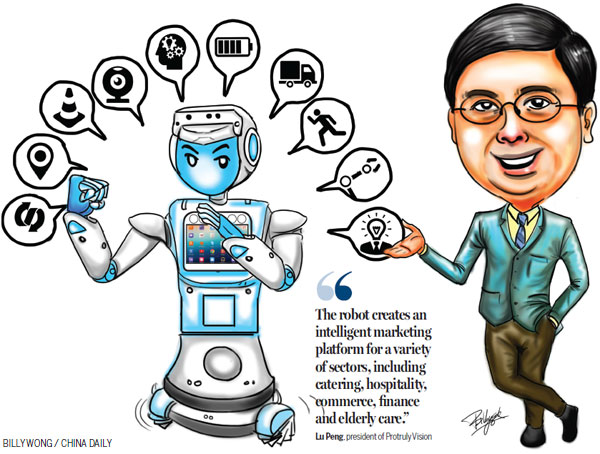It'll be a bigger and bigger robotic world
Updated: 2017-01-26 07:32
By Zhou Mo in Shenzhen(HK Edition)
|
|||||||

Editor's note: Robots' encroachment of human space and way of life has been gaining momentum. In one way, robots are a valuable asset in business and households, helping to take over a lot of laborious chores. In another, it could present a serious threat to the workforce, particularly in the labor-intensive services sectors, as workers are gradually replaced.
With a growing number of enterprises struggling to deal with the rapid increases in labor costs and the growing need for industry upgrade, a Shenzhen-based enterprise has launched an "all-round" robot that can perform various roles - from hotel manager to security guard - helping companies to cut operating costs and boost efficiency.
The 1.4-meter-tall and 60-kilogram robot, named Dabao, carries a 10.1-inch, high-definition display screen, allowing it to make deep interaction with people. It's equipped with the function of smart charge, meaning it can turn to an automatic charging mode when its battery is down to less than 10 percent.
Using OLED display technology on its eyes, Dabao looks like a cute boy with various facial expressions. It's also smart enough to avoid obstacles with a high precision of up to three centimeters.
Amid rising human resources and marketing costs, development in a number of industries in the real economy, such as catering, hotel, real estate and retail, has been fraught with difficulties, says Lu Peng, president of Shenzhen-based Protruly Vision, which invented Dabao.
How to promote industry reform and upgrade services through technological innovation in order to enhance operating efficiency has become a serious problem for enterprises, he says.
"It's against this backdrop that our company devised and developed Dabao. The robot creates an intelligent marketing platform for a variety of sectors, including catering, hospitality, commerce, finance and elderly care."
"It'll not only help merchants make customers more loyal to them, but also reduce human resource and management costs for enterprises and lift their efficiency of services."
Focusing on intelligent manufacturing, smart hardware products have become the biggest source of revenue for Protruly Vision. According to the company's semi-annual report last year, revenue generated by smart hardware-related products reached 614 million yuan ($89.2 million), accounting for 43.42 percent of total revenue.
Last year, the company made a splash into the smartphone industry by launching the world's first smartphone that can shoot virtual reality photos and videos.

Dabao's launch signals another step forward in the company's "smart hardware plus" strategy.
According to a report by Shenzhen-based consulting firm Qianzhan Industry Research Institute, the service robot market is growing at a rate of 20 to 30 percent annually on a global scale, and is expected to hit $46.2 billion by 2017.
By the time, the Chinese mainland market for service robots is projected to reach 24 billion yuan ($3.48 billion), and its growth rate is set to accelerate as artificial intelligence technology matures, the report said.
While it's not common so far seeing robots being used in households, Piao Rongwu, a member of the executive committee of the International Federation of Robotics, predicted recently that more than 42 million units of service robots are expected to enter households worldwide from 2016 to 2019, providing elderly care, medical rehabilitation, education and entertainment services.
"The creation of the Dabao robot makes people know clearly their real demand. To make service robots an eligible member of an enterprise, a humanoid look is not enough. It also needs to be sufficiently smart and practical," Lu says, adding that the company will strive to further improve its technology to enable the robot to be applied to more areas in future.
Currently, Dabao is applied mainly in restaurants, hotels, supermarkets or airports. In restaurants, for example, it can replace waiters to provide services like reception, dish ordering, dish delivery and quick payment.
Zheng Weiqian, deputy head of the Shenzhen Catering Service Trade Association, said intelligentization of restaurants has become a trend in the catering industry. The integration of robots and restaurants will help cut restaurants' operating costs and promote their image, creating both economic and brand value for eateries.
"The launch of Dabao has created a new mode for the catering industry and will exert profound influence on its future development," says Zheng.
"Robots used for catering will have great market potential and the 'robot-plus-restaurant' model will unveil a new intelligent future for the catering business."
sally@chinadailyhk.com
(HK Edition 01/26/2017 page15)